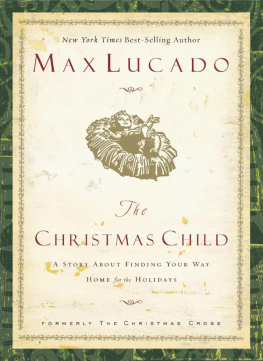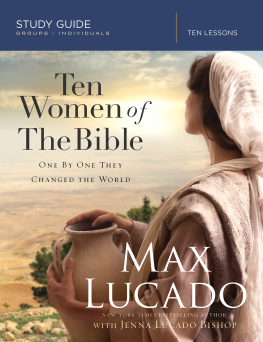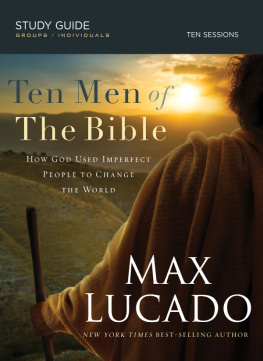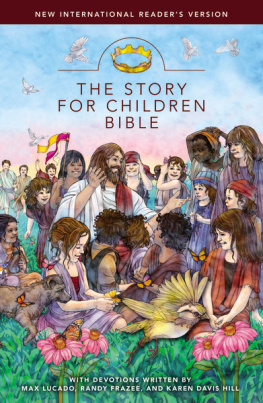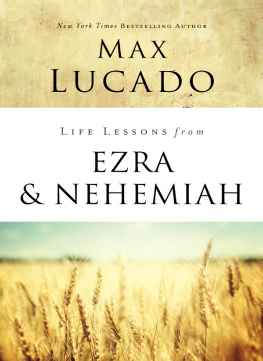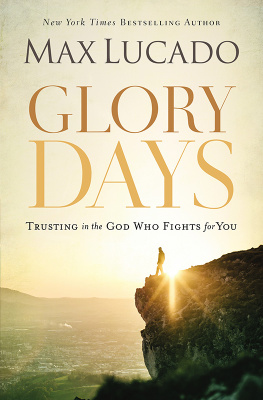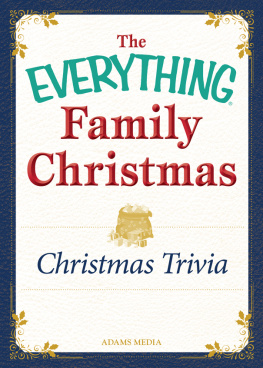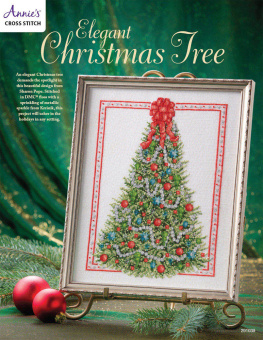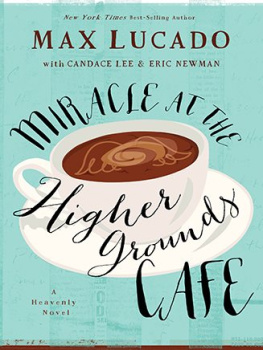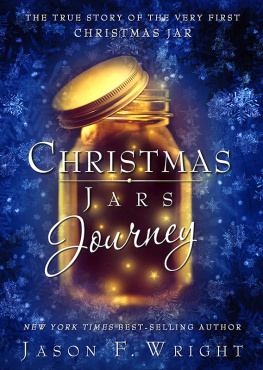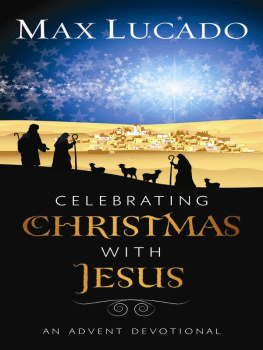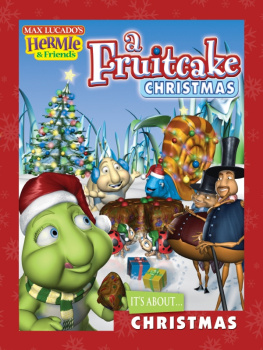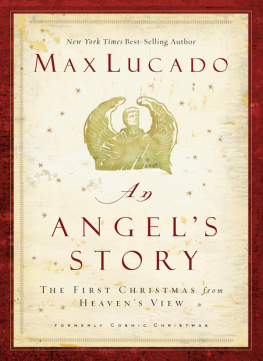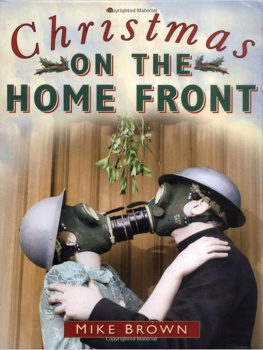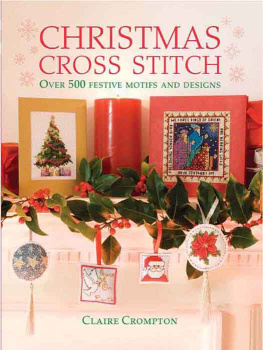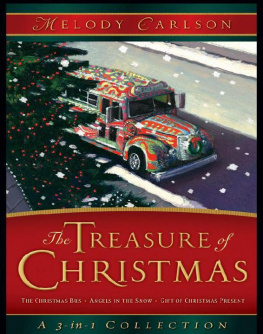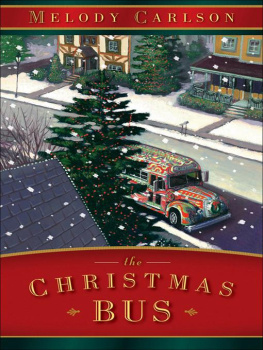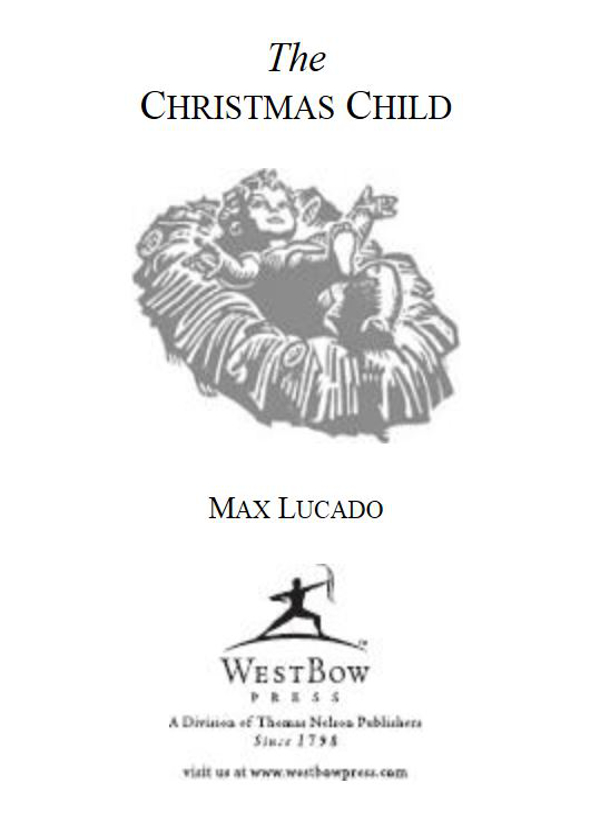The
C HRISTMAS C HILD
THE CHRISTMAS CHILD
Copyright 2003 by Max Lucado.
Previously published as The Christmas Cross.
All rights reserved. No portion of this book may be reproduced, stored in a retrieval system, or transmitted in any form or by any means-electronic, mechanical, photocopy, recording, or any other-except for brief quotations in printed reviews, without the prior permission of the publisher.
Published by WestBow Press, a Division of Thomas Nelson, Inc., P.O. Box 141000, Nashville, Tennessee 37214.
WestBow Press Books may be purchased in bulk for educational, business, fundraising, or sales promotional use. For information, please e-mail SpecialMarkets@ThomasNelson.com.
Edited by Karen Hill.
The Born Crucified excerpt comes from Max Lucados Just Like Jesus. Used by permission of W Publishing Group.
Library of Congress Cataloging-in-Publication Data
Lucado, Max
The Christmas Cross : a story about finding your own way home for the holidays / by Max Lucado
p. cm.
ISBN 1-5955-4060-1 (repackage)
ISBN 0-8499-1768-9 (hardcover)
ISBN 0-8499-1546-5 (orig. hardcover)
1. Christmas stories, American I. Title
PS3562. U225S4 1998
813'.54-dc21
98-34380
CIP
05 06 07 08 09 QW 9 8 7 6 5 4 3 2 1
Information about External Hyperlinks in this ebook
Please note that footnotes in this ebook may contain hyperlinks to external websites as part of bibliographic citations. These hyperlinks have not been activated by the publisher, who cannot verify the accuracy of these links beyond the date of publication.
Dedicated to all single parents.
May God give you strength.
Contents
FOREWORD


I n the mystery of Christmas, we find its majesty. The mystery of how God became flesh, why he chose to come, and how much he must love his people.
Such mysteries can never be solved, just as love can never be diagrammed. Christmas is best pondered, not with logic, but imagination.
This book contains Christmas imaginings. Since its release in 1998, God has used it to stretch minds and warm hearts. My earnest prayer is that it does both for you.
Max Lucado

Ilowered my windshield visor, both to block the afternoon sun and retrieve the photo. With one hand holding the picture and the other on the steering wheel, I inched my rental car down Main Street.
Clearwater, Texas, was ready for Christmas. The sky was bright winter blue. A breeze just crisp enough for a jacket swayed the large plastic bells hanging beneath the lamp lights. Aluminum garlands connected the power poles, and Frosty the Snowman chased his hat on the Dairy Kreem window. Even the pick-up truck in front of me had a wreath hanging on its tailgate. This central Texas town was ready for Christmas. But I wasnt.
I wanted to be back in Chicago. I wanted to be home. But things werent so good at home. Meg and I had fought. Weeks of suppressed tension had exploded the day before. Same song, second verse.
You promised to spend more time at home, she said.
You promised not to nag, I replied.
She says I work too much. I say weve got bills to pay. She feels neglected. I feel frustrated. Finally, she told me we needed somewhat was the word? Oh yeah, we needed some space... some time apart, and I agreed. I had an assignment in Dallas anyway, so why not go to Texas a few days early?
So, it was the fight with Meg that got me to Texas. But it was the photo that led me to Clearwater. My dad had received it in the mail. No return address. No letter. Just this photo: a black-and-white image of a large, stone building. I could barely make out the words on the sign in front: Clearwater Lutheran Church. Dad had no clue what the photo meant or who had sent it. We were familiar with the town, of course. Clearwater was where I was born and adopted. But we never lived there. My only previous visit had been when I was fresh out of college and curious. I had spent a day walking around asking questions, but that was twenty years ago. I hadnt been back since. And I wouldnt have returned now except Meg needed space and I could use an answer about the photo.
I pulled over to the side of the road and stopped in front of a two-story brick courthouse. Cardboard cutouts of Santa and his reindeer teetered on the lawn. I lowered my window and showed the photo to a couple of aging cowboys leaning against the side of a truck.
Ever seen this place? I asked.
They smiled at each other and one cowboy spoke. If youve got a strong arm, you could throw a rock from here and hit it.
He instructed me to turn right past the courthouse and turn right again. And when I did, I saw it. The church in the photo.
My preconceived notion of a small-town church didnt match what I was seeing. I had always imagined a small, white-framed building with a simple belfry over the entrance. Something like an overgrown dollhouse. Not so, this structure. The white stone walls and tall steel roof spoke of permanence. Long wings extended to the right and left. I had expressed similar surprise when Dad first showed me the photo. But he had reminded me about the large number of German immigrants in the areaimmigrants who took both their faith and their crafts seriously.
I parked in one of the diagonal spots near the church. In deference to the December chill, I put on my jacket, then grabbed my cap and gloves as I got out of the car. Tall elms canopied the wide sidewalk to the church steps. To my right was a brick sign bearing the name of the church in bronzed letters. On the left side of the church a nativity scene stood on the lawn. Although I didnt pause to examine it, I was impressed by its quality. Like the church, it seemed sturdy and detailed. I made a mental note to examine it later.
A sudden gust of wind at my back forced me to use two hands to pull open the thick wooden doors. Organ music welcomed me as I entered. With cap and gloves in hand, I stopped in the foyer. It was empty. From the look of things, it wouldnt be empty for long. The church had the appearance of a service about to happen. Large red and white poinsettias sat on the floor flanking the foyer doors. A guest book, open and ready to receive the names of visitors, rested on a podium. Garlands of pine looped across a large window that separated the foyer from the sanctuary.

Iopened the doors and took a step inside. As I did, the volume of the organ music rose a notch. A long, carpeted aisle bisected the auditorium, and a vaulted ceiling rose above it. Evening sunlight, tinted red by stained glass, cast long rectangles across the empty pews. An advent wreath hung on the pulpit, and unlit candles sat on the window sills. The only movements were those of a silver-haired woman rehearsing on the organ and an older fellow placing programs in hymnal racks. Neither noticed my entrance.

